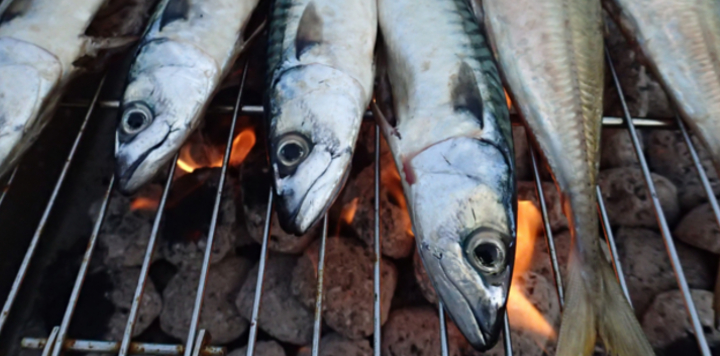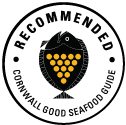

Whole mackerel - fresh as possible -preferably within a few hours of being caught.
Lemon
Salad
Barbecue - preferably use lumpwood charcoal from a sustainable source or a gas barbecue.
Mackerel that has been freshly caught - preferably line caught and kept on ice and then prepared and cooked within a few hours of capture has a fantastic firm texture and as long as its not over cooked it has incredible moisture and taste.
Gut and clean the mackerel
this is easy - just make a slit along the belly of the fish, pull out the contents and then wash.
There is no need to remove scales, you can cut off the fins and head but this is optional.
Barbecue the whole fish on its side over some moderately hot coals.
Cook for 3 to 5 minutes on each side until the skin starts to burn and go crispy.
The mackerel will fall apart if you turn it too often so keep interference to a minimum.
Oils from the fish may cause the coals to flare - make sure you can easily lift the fish away from flames - by raising the grill or by moving them.
The skin will break up and eventually crisp off - don't worry if it goes a bit black - the oils in mackerel make it quite hard to over cook.
Check that the meat has turned from pinkish to pale brown throughout and it is hot right through. Now its cooked!
Drizzle with freshly squeezed lemon or lime.
Serve with good brown bread and some salad.
The meat easily comes away from the bones. Make sure you carefully remove the meat from the rib cage as the rib bones are the only ones to worry about. Any other small bones can easily be chewed up with some bread.
Enjoy!

Cornish waters VIIe, f, g and h
Ring nets are used to encircle a shoal of pelagic fish. the main target species are sardines and anchovies but occasionally there is a by catch of mackerel landed.

Cornwall
Gill nets are used during winter months on the south coast to target mackerel.

Cornwall areas VIIe and VIIf
Mackerel handling is a low impact, selective method of fishing using hook and line.


Cornwall Good Seafood Guide is underpinned by the Marine Conservation Society (MCS) Good Fish Guide. The first UK consumer guide to sustainable seafood. For more information visit www.fishonline.org
Cornwall Good Seafood Guide is here to help us all make sustainable seafood choices. Choices that will help us keep the oceans healthy and Cornish fishers' futures safe. This website is funded by Cornwall Wildlife Trust. If you would like to make a meaningful difference to the health of our oceans, please consider making a donation to the Cornwall Wildlife Trust Ocean Emergency fund. Your donation will help safeguard these remarkable environments, ensuring that they continue to thrive for generations to come. Together, we can be stewards of the seas and champions for a healthier, more sustainable future.